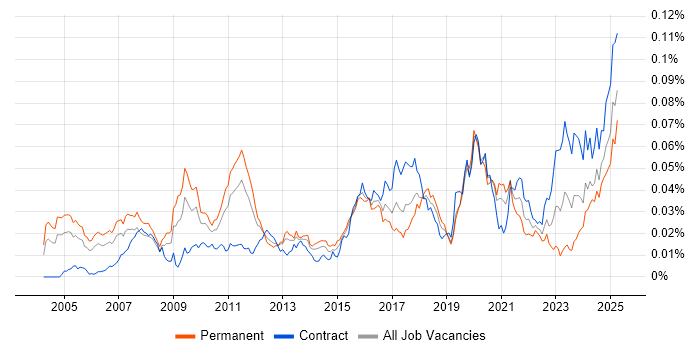Quantitative Finance (Mathematical Finance)
UK
The table below provides summary statistics for permanent job vacancies requiring Quantitative Finance skills. It includes a benchmarking guide to the annual salaries offered in vacancies that cited Quantitative Finance over the 6 months leading up to 31 May 2025, comparing them to the same period in the previous two years.
| 6 months to 31 May 2025 |
Same period 2024 | Same period 2023 | |
|---|---|---|---|
| Rank | 666 | 882 | 952 |
| Rank change year-on-year | +216 | +70 | +273 |
| Permanent jobs citing Quantitative Finance | 36 | 25 | 16 |
| As % of all permanent jobs advertised in the UK | 0.064% | 0.024% | 0.017% |
| As % of the Processes & Methodologies category | 0.069% | 0.029% | 0.017% |
| Number of salaries quoted | 8 | 5 | 5 |
| 10th Percentile | £72,875 | £44,000 | £62,250 |
| 25th Percentile | £92,188 | £46,250 | £86,250 |
| Median annual salary (50th Percentile) | £112,500 | £47,500 | £87,500 |
| Median % change year-on-year | +136.84% | -45.71% | -5.41% |
| 75th Percentile | £187,500 | £162,500 | £88,750 |
| 90th Percentile | £231,000 | £195,500 | £127,000 |
| UK excluding London median annual salary | £100,000 | £47,500 | - |
| % change year-on-year | +110.53% | - | - |
All Process and Methodology Skills
UK
Quantitative Finance falls under the Processes and Methodologies category. For comparison with the information above, the following table provides summary statistics for all permanent job vacancies requiring process or methodology skills.
| Permanent vacancies with a requirement for process or methodology skills | 52,256 | 87,133 | 91,481 |
| As % of all permanent jobs advertised in the UK | 93.58% | 84.04% | 95.51% |
| Number of salaries quoted | 25,854 | 60,896 | 54,581 |
| 10th Percentile | £28,822 | £29,250 | £34,000 |
| 25th Percentile | £41,250 | £40,000 | £45,000 |
| Median annual salary (50th Percentile) | £57,000 | £55,000 | £60,899 |
| Median % change year-on-year | +3.64% | -9.69% | +1.50% |
| 75th Percentile | £75,000 | £72,500 | £81,250 |
| 90th Percentile | £97,500 | £92,500 | £100,000 |
| UK excluding London median annual salary | £51,564 | £50,000 | £55,000 |
| % change year-on-year | +3.13% | -9.09% | +4.76% |
Quantitative Finance
Job Vacancy Trend
Job postings citing Quantitative Finance as a proportion of all IT jobs advertised.

Quantitative Finance
Salary Trend
3-month moving average salary quoted in jobs citing Quantitative Finance.
Quantitative Finance
Salary Histogram
Salary distribution for jobs citing Quantitative Finance over the 6 months to 31 May 2025.
Quantitative Finance
Top 7 Job Locations
The table below looks at the demand and provides a guide to the median salaries quoted in IT jobs citing Quantitative Finance within the UK over the 6 months to 31 May 2025. The 'Rank Change' column provides an indication of the change in demand within each location based on the same 6 month period last year.
| Location | Rank Change on Same Period Last Year |
Matching Permanent IT Job Ads |
Median Salary Past 6 Months |
Median Salary % Change on Same Period Last Year |
Live Jobs |
|---|---|---|---|---|---|
| England | +170 | 24 | £112,500 | +136.84% | 63 |
| London | +104 | 21 | £170,000 | +1.49% | 61 |
| UK excluding London | +195 | 15 | £100,000 | +110.53% | 4 |
| Scotland | - | 12 | - | - | 1 |
| Work from Home | +118 | 4 | £125,000 | +163.16% | 14 |
| South East | +77 | 2 | £105,000 | +121.05% | 3 |
| South West | - | 1 | £87,500 | - |
Quantitative Finance
Co-occurring Skills and Capabilities by Category
The follow tables expand on the table above by listing co-occurrences grouped by category. The same employment type, locality and period is covered with up to 20 co-occurrences shown in each of the following categories:
